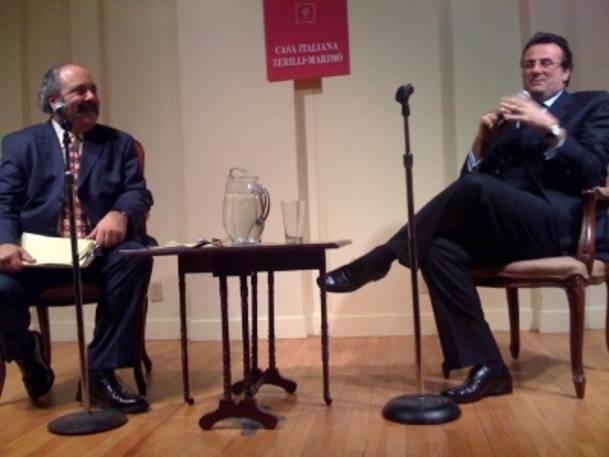


Everyone around the world knows and loves Italian culture. There is no doubt about it. Products, food, works of art, and literature: anything from our country is recognized as excellent. The “made in Italy” is a sort of guarantee worldwide.
The same holds true for opera. If you asked anyone to name the first opera composer who comes to mind, he or she would definitely answer Verdi, Puccini, or Bellini. Debuting or performing in Italian opera houses has always been considered a privilege, even for the greatest tenors and sopranos such as Pavarotti, Maria Callas, and Placido Domingo.
That has been true until today. La Scala [2] in Milano or San Carlo [3] in Naples run the risk of closing. Foreign singers are busy in other cities and in other countries with wider audiences. Opera is
becoming more and more popular, especially in the U.S., while our fellow Italians seem to prefer other kinds of entertainment. Attending performances of La Traviata, for example, is clearly part of upper class etiquette. But a small, elite crowd cannot fill a theater and certainly cannot sustain its activities and maintenance. The one thing it can do, and often does, is monopolize the environment, often preventing any kind of innovation that would attract a wider audience.
Because New York is quickly surpassing Italy as a primary and privileged center for opera débuts and production, it is essential to begin with this city to find a way to reverse this trend.
This is why Casa Italiana Zerilli Marimò introduced a new series of debates on the issue entitled Adventures in Italian Opera. During each of the five scheduled events, Fred Plotkin, one of the world’s most distinguished experts in the field, will interview internationally renowned tenors and sopranos. The title of the event is taken from the fact that promoting opera in Italy has
become a real challenge for both managers and artists, as Plotkin admitted: “Americans love opera, much more then Italians. I love Italy, I studied there, and I own a house in Liguria where I spend part of the year. But I must admit that the United States is supporting this art form much more than Italy does. Here there are more then 200 opera houses. Singers come from all over the world to begin their careers in this country and most of the time they decide to remain on this side of the ocean. Perhaps this is also true because critics here are less severe than in Italy, where they sometimes throw stones just for fun. This is the country of innovation, of opportunities, and it hardly goes well with Italian purism.”
Marcello Giordani is among the talented opera singers who found fortune in the United States. He first debuted as the duke in Rigoletto in Spoleto, Italy in 1986. Since he wasn’t offered any major roles after that performance, he decided to move to the U.S. where he introduced himself to the American public as Nadir in Les Pêcheurs de Perles at the Portland Opera during its 1988-89 season. He debuted at the Metropolitan Opera playing Nemorino in L'Elisir d'Amore in 1993.
This legendary theater soon became his second home, New York his second city, and its people his second family: “If I had decided to stay in Italy I would be starving by now. I am serious. My country doesn’t love its children, it doesn’t take care of them, and so we must leave. In America I was given the opportunity to grow as an artist right from the very beginning. Then I fell in love with the Met and with New York, and I feel I owe a lot to this city. That’s why I just cancelled a huge production in Europe just to sing in this city for one evening. Pavarotti [4] and Franco Corelli [5] were also treated very badly in Italy at the beginning of their careers, and that’s why Big Luciano considered New York to be his ideal artistic environment. […] Critics in Italy consider me a “house tenor,” which is a great offense. I want to tell them that it is not fair that they treat me this way. I always accept critics’ comments when they are precise and honest, but I hate it when they are based on nothing at all.”
The interview lasted for more than an hour and alternated between moments of pure fun and deep reflection. Given what was said, we wonder whether opera is the only form of cultural expression whose paradigm is still coping with the limitations of national boundaries and is so far from becoming global.
Following is the schedule of events in the series:
Adventures in Italian Opera: Tuesdays with Fred Plotkin and Stars from the World of Opera
Maija Kovalevska
December 16, 2008 at 6 pm
Dolora Zajick
February 17, 2009 at 6 pm
Maestro Evelino Pidò
March 10, 2009 at 6 pm
Barbara Frittoli
April 14, 2009 at 6 pm
Casa Italiana Zerilli-Marimò
24 West 12th Street (between 5th and 6th Avenues), NYC
Information: 212.998.8730
http://www.nyu.edu/pages/casaitaliana [6]
(Edited by Giulia Prestia)
Source URL: http://test.iitaly.org/magazine/focus/art-culture/article/great-tenors-and-sopranos-leave-italy-casa-italiana-zerilli
Links
[1] http://test.iitaly.org/files/adventure-italian-opera1228514242jpg
[2] http://www.teatroallascala.org
[3] http://www.teatrosancarlo.it/home/home.html
[4] http://www.lucianopavarotti.com/indexita.html
[5] http://www.francocorelli.org
[6] http://www.nyu.edu/pages/casaitaliana
[7] http://www.nyu.edu/pages/casaitaliana/index_html.html
[8] http://www.marcellogiordani.com